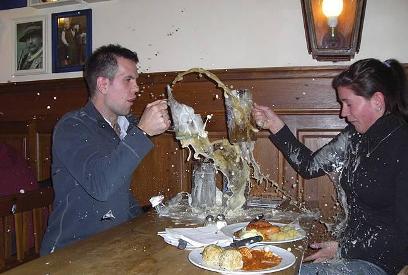
Forget Schadenfreude, these are even better.
1) Weltschmerz (n.): mental depression or apathy caused by comparison of the actual state of the world with an ideal state
They say that the grass is greener on the other side, but it’s that kind of mindset that causes the grass on your side of the picket fence to look gray and infested with earwigs. Which is to say, comparing a perfect situation to the real life scenario is bound to land you with severe case of weltschmerz, a word used to describe the disappointment you feel after watching the inevitable destruction of your unrealistic expectations. (Thanks for that, every Disney movie ever.)
2) Kummerspeck (n.): excess weight gained from emotional overeating
One can always count on the Germans to be literal and they do not disappoint with kummerspeck, the exact translation of this phrase being “grief bacon.” As in, “I bombed that test on vegetarianism so badly, I need some bacon to cure my grief.” Other possible food substitutes include candy, ice cream, tubs of cookie dough, bathtubs of cookie dough, and carrots, for all you “healthy” stress eaters that put the rest of us to shame.
3) Torschlusspanik (n.): the fear, usually as one gets older, that time is running out and important opportunities are slipping away
Picture this: you’re 26 years old. You’re living with your parents and struggling to maintain the underpaid assistant job, meanwhile, your best friends are landing CEO positions and securing future husbands. Nothing is happening according to the 5-year plan that you made during your senior year of college, and you can’t help shake the feeling that someone accidentally clicked “fast forward” on your life. That particular type of desperation is known as torschlusspanik, meaning “fear of the gate closing.”
4) Fremdschämen (n.): the almost-horror you feel when you notice that somebody is oblivious to how embarrassing they truly are
The only thing worse than being in an embarrassing situation is watching someone enter an embarrassing situation and being powerless to stop it. Grandparents and sitcom characters are usually the worst offenders of obliviousness and the most likely to evoke fremdschamen, or the cathartic sense of pain you feel witnessing another person make a fool of themselves.
5) Backpfeifengesicht (n.): a face that cries out for a fist in it
You all know one of these people.
6) Erklärungsnot (n.): the state of having to quickly explain yourself
Erklarungsnot refers to the exact moment you are caught with your hand in the cookie jar and forced to explain yourself with only a split second to think. Unless you’re a good liar, the results of erklarungsnot are usually unbelievable and silly, like “my dog ate my homework” or “I didn’t know streaking through the grocery store was illegal!”
7) Treppenwitz (n.): the things you should have said but only occur to you when it is too late
Also known as, every comeback you’ve ever had that only came to you 20 minutes after the other person walked away. The Germans have a word for that, treppenwitz, and it perfectly describes my existence.
8) Vergangenheitsbewaeltigung (n.): the struggle to come to terms with the past
Listen… you can’t take back that one time you sneezed all over your crush or got catfished by a 12-year-old boy on the Internet. What makes the past so special is that it cannot be changed. The Germans know this concept so well that they made a whole new word for it, one that I will not type out again because it might take me a year or two.
9) Handschuhschneeballwerfer (n.): a coward willing to criticize and abuse from a safe distance
The literal translation of this word might provide some more perspective: a person who wears gloves to throw snowballs. No? It doesn’t? Well, that’s a shame. As far as I know, this term is meant to describe someone who chooses to talk behind someone’s back instead of to their face.
10) Allgemeinbildung (n.): everything that any adult capable of living independently can reasonably be expected to know
There is technically a phrase for this in English, “common sense,” but allgemeinbildung turns it into one word and gives you another excuse to speak German.
11.) Jantelagen: Swedish term for ignoring success of others
When someone famous enters the room, and all the people around use up all their energy to ignore the fact that the person is famous.
12.) Hygge: Danish term to describe a characteristic of coziness on comfortable conviviality that engenders a feeling of contentment or well-being.
When it is snowing out and you’re in your flannel PJ’s snug as a bug in a cashmere rug cradling your hot cocoa in two hands, you’re getting Hygge with it.
13.) Lagom: Swedish term to describe a quality of “ something in just the right amount”, or done in comfortable moderation and balance
Welcome to the Goldilocks zone: everything in moderation, so it feels exactly right.
14.) Fika: Swedish word for a break in the day for coffee and something sweet, expressly for the purpose of setting aside a moment in time
Overheard in offices across Stockholm at 2:00 pm. “Let’s Fika?” “No, Can you Go Fika Yourself”. “Impossible!”
15.) Orka: Swedish term relating to be bothered to do something.
Not bothered in the sense of being nagged into to doing it. Orka is the internal itch that makes you act.
16.) Gruglede: Swedish emotion which occurs when regarding and upcoming event your looking forward to with a mix of excitement and dread.
“Gruglede” is like excitement, with a tinge of fear. Like you might feel on the first day of school, or waiting for a new baby, or a new Mets season. It comes from the words “grue,” meaning dread, and “glede,” which means to happily look forward to something.
17.) Kalsarikännit: Finnish tradition literally means “drinking at home, alone, in your underwear”
Loosely translated and anglicized as “päntsdrunk and is basically 2020 in a nutshell
18.) Saudade: Portuguese term for sense of loss over something you never had.
Saudade refers to a longing for something you don’t or can’t have, but it’s, like, more than that, though. A nostalgia for something you’ve never known… kinda. There’s a lot to unwrap there.
19.) Mamihlapinatapai Argentinian word for the look shared between two people when both are wishing the other would do something neither wants to
Washing the dishes after dinner, cleaning out the litter box, the possibilities are endless.
